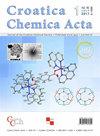苦橙皮精油的化学成分及抗氧化活性研究使用两种方法
IF 0.9
4区 化学
Q4 CHEMISTRY, MULTIDISCIPLINARY
引用次数: 21
摘要
本研究表明,从苦橘皮(Aurantii amari flavedo,Citrus aurantium L.,来自克罗地亚)中提取的精油的化学成分取决于分离方法。采用加氢蒸馏和冷压法得到果皮精油,并用气相色谱-质谱联用技术对其化学成分进行了分析。通过质谱和线性保留指数对22种组分进行了表征。在加氢蒸馏和冷榨精油中,柠檬烯分别占91.1%和51.3%。当比较两种油的化学组成时,观察到三种主要化合物,柠檬烯、芳樟醇和十六烷酸的百分比组成存在显著差异。采用2,2-二苯基-1-苦基肼自由基清除法(DPPH)测定了其抗氧化活性。这两种油的抗氧化活性都很差。本文章由计算机程序翻译,如有差异,请以英文原文为准。
Chemical Composition and Antioxidant Activity of Essential Oil Obtained from Bitter Orange Peel (Citrus aurantium L.) Using Two Methods
In this study, it was shown that the chemical composition of the essential oil obtained from bitter orange peel (Aurantii amari flavedo, Citrus aurantium L., from Croatia) depends on the method of isolation. The peel essential oil was obtained by hydrodistillation and cold press method, and their chemical compositions were analyzed by gas chromatography-mass spectrometry (GC-MS). Twenty two components were characterized by mass spectra and linear retention indices. Limonene was found as dominant compound in both hydrodistillation and cold press essential oil with 91.1 % and 51.3 %, respectively. When comparing the chemical composition of two oils, a significant difference in percentage composition of three major compounds, limonene, linalool and hexadecanoic acid was observed. The antioxidant activity of the oils was tested using 2,2-diphenyl-1-picrylhydrazyl radical scavenging method (DPPH). Both oils showed very poor antioxidant activity.
求助全文
通过发布文献求助,成功后即可免费获取论文全文。
去求助
来源期刊

Croatica Chemica Acta
化学-化学综合
CiteScore
0.60
自引率
0.00%
发文量
3
审稿时长
18 months
期刊介绍:
Croatica Chemica Acta (Croat. Chem. Acta, CCA), is an international journal of the Croatian Chemical Society publishing scientific articles of general interest to chemistry.
 求助内容:
求助内容: 应助结果提醒方式:
应助结果提醒方式:


